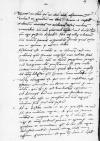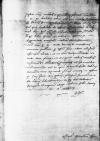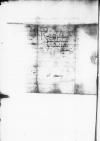Quia dominus Achatius von Zehmen (Achacy Cema) (*ca. 1485 – †1565), 1517-1531 Chamberlain of Pomerania, 1531-1546 Castellan of Gdańsk (Danzig), 1545-1546 Voivode of Kulm (Chełmno), 1546-1565 Voivode of Marienburg (Malbork) (SBPN 1, p. 194-195; ORACKI 1984, p. 38-39; Urzędnicy 5/2, p. 198; PSB 4, p. 325-326)⌊castellanus GedanensisAchatius von Zehmen (Achacy Cema) (*ca. 1485 – †1565), 1517-1531 Chamberlain of Pomerania, 1531-1546 Castellan of Gdańsk (Danzig), 1545-1546 Voivode of Kulm (Chełmno), 1546-1565 Voivode of Marienburg (Malbork) (SBPN 1, p. 194-195; ORACKI 1984, p. 38-39; Urzędnicy 5/2, p. 198; PSB 4, p. 325-326)⌋, auritus et oculatus testis, melius enarrabit ea omnia, quae vel aguntur, vel dicuntur hic, quam ego possem describere, ideo ad illius relationem omnia reiciens, paucis respondebo ad superinscribed⌈adad superinscribed⌉ bina written over i⌈iaa written over i⌉s, quas postremo Vestra Reverendissima Paternitas ad me dedit.
Absolutus est a Sigismund I Jagiellon (Zygmunt I) (*1467 – †1548), King of Poland and Grand Duke of Lithuania (1506-1548); Duke of Głogów (Glogau) (1499-1506), Duke of Opava (1501-1506), Governor of Silesia (1504-1506); son of King Kazimierz IV Jagiellon and Elisabeth of Austria⌊maiestate regiaSigismund I Jagiellon (Zygmunt I) (*1467 – †1548), King of Poland and Grand Duke of Lithuania (1506-1548); Duke of Głogów (Glogau) (1499-1506), Duke of Opava (1501-1506), Governor of Silesia (1504-1506); son of King Kazimierz IV Jagiellon and Elisabeth of Austria⌋ dominus Gdanensis tam in publicis quam privatis negotiis meo iudicio satis bene, et ut nunc tempora et homines optime peregit omnia, maxime vero publica, in quo nolo iactare meum obsequium, quod Deo teste impendi non minus diligenter quam sincere, immo audent written over ...⌈... illegible⌈...... illegible⌉tt written over ...⌉er etc.
Volski obiurgatus est per me de insolentia a se praestata admissa in domo Vestrae Reverendissimae Paternitatis et alibi, qui tamen se cum iureiurando excusat, sed deinceps, dum in mea in facultate erit, q non ibit ipse in Prussia, region in central Europe, bordered by Pomerania, Poland, Lithuania and Livonia. From 1466 Prussia was divided into Royal Prussia (Prussia Regalis), which was a part of the Kingdom of Poland, and Teutonic Prussia (Prussia Ordinis Theutonici) – covering the remnants of the former territory of the Teutonic Order’s state in Prussia. In 1525, the Order’s last Grand Master, Albrecht von Hohenzollern, converted to Lutheranism and became the first lay duke in former Teutonic Prussia (dux in Prussia), which from then on was called Ducal Prussia (Prussia Ducalis). At that time, as a result of the treaty of Cracow, Ducal Prussia became a fief of the kings of Poland⌊PrussiamPrussia, region in central Europe, bordered by Pomerania, Poland, Lithuania and Livonia. From 1466 Prussia was divided into Royal Prussia (Prussia Regalis), which was a part of the Kingdom of Poland, and Teutonic Prussia (Prussia Ordinis Theutonici) – covering the remnants of the former territory of the Teutonic Order’s state in Prussia. In 1525, the Order’s last Grand Master, Albrecht von Hohenzollern, converted to Lutheranism and became the first lay duke in former Teutonic Prussia (dux in Prussia), which from then on was called Ducal Prussia (Prussia Ducalis). At that time, as a result of the treaty of Cracow, Ducal Prussia became a fief of the kings of Poland⌋ cum litteris regiis. Aliud in praesens facere non possum.
Ad dominum Stanisław Kostka (*1487 – †1555), as a leader of the so-called nobles' party active in Royal Prussia since 1536, Kostka stood in opposition to most of the members of the Council of Royal Prussia, who wanted to maintain the autonomy of the province and a "balance of power" in terms of governance. The tension between the Prussian Subtreasurer and the Council had been increasing since the Diet in Graudenz (Grudziądz) in 1533. Kostka, connected with the royal court since his youth, was sent to Graudenz as the King's deputy and, contrary to custom, decided to take part in the proceedings. In response to such a step, the Council members stopped the meeting. Kostka accused them of hostility towards the Poles and intervened on this matter at the court. In the absence of the then Bishop of Ermland (Mauritius Ferber) it was Dantiscus who chaired the Graudenz Diet. The incident badly harmed his future relationships with Kostka; 1531-1555 Treasurer of the Prussian lands and Treasurer of Marienburg (Malbork); 1544-1545 Castellan of Elbing (Elbląg), 1545-1546 Castellan of Kulm (Chełmno); 1546-1549 Vice-Voivode of Kulm; 1546-1551 Voivode of Pomerania; 1551-1555 Voivode of Kulm (PSB 14, p. 356; Urzędnicy 5/2, p. 216; MAŁŁEK 1976, p. 119-123)⌊KostkkaStanisław Kostka (*1487 – †1555), as a leader of the so-called nobles' party active in Royal Prussia since 1536, Kostka stood in opposition to most of the members of the Council of Royal Prussia, who wanted to maintain the autonomy of the province and a "balance of power" in terms of governance. The tension between the Prussian Subtreasurer and the Council had been increasing since the Diet in Graudenz (Grudziądz) in 1533. Kostka, connected with the royal court since his youth, was sent to Graudenz as the King's deputy and, contrary to custom, decided to take part in the proceedings. In response to such a step, the Council members stopped the meeting. Kostka accused them of hostility towards the Poles and intervened on this matter at the court. In the absence of the then Bishop of Ermland (Mauritius Ferber) it was Dantiscus who chaired the Graudenz Diet. The incident badly harmed his future relationships with Kostka; 1531-1555 Treasurer of the Prussian lands and Treasurer of Marienburg (Malbork); 1544-1545 Castellan of Elbing (Elbląg), 1545-1546 Castellan of Kulm (Chełmno); 1546-1549 Vice-Voivode of Kulm; 1546-1551 Voivode of Pomerania; 1551-1555 Voivode of Kulm (PSB 14, p. 356; Urzędnicy 5/2, p. 216; MAŁŁEK 1976, p. 119-123)⌋ mitto Vestrae Reverendissimae Paternitati pro censu et mansis duo mandata regia, de quo, ut statuit Sigismund I Jagiellon (Zygmunt I) (*1467 – †1548), King of Poland and Grand Duke of Lithuania (1506-1548); Duke of Głogów (Glogau) (1499-1506), Duke of Opava (1501-1506), Governor of Silesia (1504-1506); son of King Kazimierz IV Jagiellon and Elisabeth of Austria⌊maiestas regiaSigismund I Jagiellon (Zygmunt I) (*1467 – †1548), King of Poland and Grand Duke of Lithuania (1506-1548); Duke of Głogów (Glogau) (1499-1506), Duke of Opava (1501-1506), Governor of Silesia (1504-1506); son of King Kazimierz IV Jagiellon and Elisabeth of Austria⌋, accipiet Vestra Reverendissima Paternitas 40 du(catos) Gdanenses, et rogo, si animum inducere poterit Vestra Reverendissima Paternitas, ut ignoscat et remittat. Quando de hoc ille aget honestis modis, faciet Sigismund I Jagiellon (Zygmunt I) (*1467 – †1548), King of Poland and Grand Duke of Lithuania (1506-1548); Duke of Głogów (Glogau) (1499-1506), Duke of Opava (1501-1506), Governor of Silesia (1504-1506); son of King Kazimierz IV Jagiellon and Elisabeth of Austria
Bona Sforza (*1494 – †1557), Queen of Poland and Grand Duchess of Lithuania (1518-1557); the second wife of Sigismund I Jagiellon; Duchess of Bari and Rossano; daughter of Gian Galeazzo Sforza of Milan and Isabella of Aragon⌊utrique maiestatiSigismund I Jagiellon (Zygmunt I) (*1467 – †1548), King of Poland and Grand Duke of Lithuania (1506-1548); Duke of Głogów (Glogau) (1499-1506), Duke of Opava (1501-1506), Governor of Silesia (1504-1506); son of King Kazimierz IV Jagiellon and Elisabeth of Austria
Bona Sforza (*1494 – †1557), Queen of Poland and Grand Duchess of Lithuania (1518-1557); the second wife of Sigismund I Jagiellon; Duchess of Bari and Rossano; daughter of Gian Galeazzo Sforza of Milan and Isabella of Aragon⌋ rem apprime gratam, de quo tamen dicet dominus castellanus.
 AAWO, AB, D. 5, f. 4v
AAWO, AB, D. 5, f. 4v
Dominus plebanus Marienburgensis scripsit ad me, obnixe rogans, ut ei impetrem gratiam et indulgentiam apud Paternitatem Vestram Reverendissimam, affirmans se numquam minimo verbo adversus dignitatem Paternitatis Vestrae Reverendissimae excessise promittensque se velle morigerum praestare erga Paternitatem Vestram Reverendissimam, quam plurimum uti praelatum suum semper recognoscere et debita veneratione habere pollicetur. Rogo itaque, dignetur Vestra Reverendissima Paternitas in hoc sacro remissionis tempore, quod abstinentiae non potus aut cibi tantum, sed affectuum cordi nostro insitorum dicatum est hunc sacerdotem, veniam petentem, in gremium clementiae suae suscipere et s culpam, si quam admisit, condonare, ut Deus Omnipotens omnia delicta Vestrae Paternitatis Reverendissimae remittat.
De his, quae ad me umquam de negotiis Prussiacis aut Vestrae Reverendissimae Paternitatis scripta sunt, nihil est perventum. Ad Sigismund I Jagiellon (Zygmunt I) (*1467 – †1548), King of Poland and Grand Duke of Lithuania (1506-1548); Duke of Głogów (Glogau) (1499-1506), Duke of Opava (1501-1506), Governor of Silesia (1504-1506); son of King Kazimierz IV Jagiellon and Elisabeth of Austria⌊maiestatem regiamSigismund I Jagiellon (Zygmunt I) (*1467 – †1548), King of Poland and Grand Duke of Lithuania (1506-1548); Duke of Głogów (Glogau) (1499-1506), Duke of Opava (1501-1506), Governor of Silesia (1504-1506); son of King Kazimierz IV Jagiellon and Elisabeth of Austria⌋ nihil penitus adversus Vestram Reverendissimam Paternitatem scriptum est, praeter unas litteras, quae tamen modeste satis scriptae erant. Quod Bona Sforza (*1494 – †1557), Queen of Poland and Grand Duchess of Lithuania (1518-1557); the second wife of Sigismund I Jagiellon; Duchess of Bari and Rossano; daughter of Gian Galeazzo Sforza of Milan and Isabella of Aragon⌊maiestas reginalisBona Sforza (*1494 – †1557), Queen of Poland and Grand Duchess of Lithuania (1518-1557); the second wife of Sigismund I Jagiellon; Duchess of Bari and Rossano; daughter of Gian Galeazzo Sforza of Milan and Isabella of Aragon⌋ agitetur istis delationibus, non mirum, cuperet enim omnia de Vestra Reverendissima Paternitate et dici, et scribi laudatissima, utpote de sua creatura, et ob eam superinscribed⌈eameam superinscribed⌉ rem misit ad Vestram Reverendissimam Paternitatem famulum suum, dominum Mikołaj Grabia (*before 1500 – †1549), 1534-1543 Chamberlain in Sieradz; 1544 Castellan of Chełm; 1547 Crown Vice-Chancellor (Urzędnicy 10)⌊GrabyaMikołaj Grabia (*before 1500 – †1549), 1534-1543 Chamberlain in Sieradz; 1544 Castellan of Chełm; 1547 Crown Vice-Chancellor (Urzędnicy 10)⌋, cum legatione paulo acerbiore. Sed haec non permoveant Vestram Reverendissimam Paternitatem, ut conturbari debeat, praesertim cum vitio vacat,  AAWO, AB, D. 5, f. 5r postea enim Bona Sforza (*1494 – †1557), Queen of Poland and Grand Duchess of Lithuania (1518-1557); the second wife of Sigismund I Jagiellon; Duchess of Bari and Rossano; daughter of Gian Galeazzo Sforza of Milan and Isabella of Aragon⌊maiestas reginalisBona Sforza (*1494 – †1557), Queen of Poland and Grand Duchess of Lithuania (1518-1557); the second wife of Sigismund I Jagiellon; Duchess of Bari and Rossano; daughter of Gian Galeazzo Sforza of Milan and Isabella of Aragon⌋ explorata innocentia Vestrae Reverendissimae Paternitatis, habebit odio eos, qui mala seminant de bonis servitoribus. Reliqua dicet dominus castellanus, cum quo habunde de omnibus libere satis contuli, nam hoc tempore non de omnibus tutum est scribere.
AAWO, AB, D. 5, f. 5r postea enim Bona Sforza (*1494 – †1557), Queen of Poland and Grand Duchess of Lithuania (1518-1557); the second wife of Sigismund I Jagiellon; Duchess of Bari and Rossano; daughter of Gian Galeazzo Sforza of Milan and Isabella of Aragon⌊maiestas reginalisBona Sforza (*1494 – †1557), Queen of Poland and Grand Duchess of Lithuania (1518-1557); the second wife of Sigismund I Jagiellon; Duchess of Bari and Rossano; daughter of Gian Galeazzo Sforza of Milan and Isabella of Aragon⌋ explorata innocentia Vestrae Reverendissimae Paternitatis, habebit odio eos, qui mala seminant de bonis servitoribus. Reliqua dicet dominus castellanus, cum quo habunde de omnibus libere satis contuli, nam hoc tempore non de omnibus tutum est scribere.
Ego dabo operam, ut rebus Vestrae Reverendissimae Paternitatis et dignitati consulere valeam et inservire, Vestra autem Paternitas Reverendissima recto tramite incedens, munia publica pro officio suo citra aliquorum offensam obeat et in animi tranquillitate vivat, Deo, principi et reipublicae omnibus viribus inserviens delatoresque iniquos non reformidet, nam venient ad te, qui detrahebant tibi etc.
Commendo me ex corde fraterno amori Vestrae Reverendissimae Paternitatis, cui precor Dei gratiam, principum favorem et hominum dilectionem et post hos labores sempiternam requiem.
 AAWO, AB, D. 5, f. 5r postea enim
AAWO, AB, D. 5, f. 5r postea enim 


